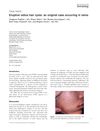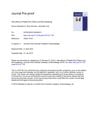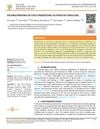 4 citations,
June 2020 in “British Journal of Pharmacology”
4 citations,
June 2020 in “British Journal of Pharmacology” Activating TRPV4 in skin cells helps regrow hair in mice, possibly offering a treatment for hair loss.
 4 citations,
April 2019 in “Cell Stem Cell”
4 citations,
April 2019 in “Cell Stem Cell” Certain immune cells in the skin can stop hair from growing.
 4 citations,
July 2014 in “International Journal of Dermatology”
4 citations,
July 2014 in “International Journal of Dermatology” Twins had rare skin cysts likely due to genetics.
 3 citations,
February 2021 in “Medical journal, Armed Forces India”
3 citations,
February 2021 in “Medical journal, Armed Forces India” Combination therapy promotes better hair growth and density.
 3 citations,
May 2020 in “Actas Dermo-Sifiliográficas”
3 citations,
May 2020 in “Actas Dermo-Sifiliográficas” PRP injections increased hair density in men with hair loss but didn't work for everyone and more research is needed.
 3 citations,
August 2019 in “Journal of The American Academy of Dermatology”
3 citations,
August 2019 in “Journal of The American Academy of Dermatology” PRP with microneedling is generally safe but can cause minor side effects like scalp itching, temporary hair shedding, and swollen lymph nodes.
 3 citations,
April 2019 in “Annals of hepatology”
3 citations,
April 2019 in “Annals of hepatology” Peanut allergies can be transferred through organ transplants.
 1 citations,
January 2011 in “International Journal of Trichology”
1 citations,
January 2011 in “International Journal of Trichology” Hair follicle stem cells have significant potential for treating various disorders.
 March 2024 in “Clinical, cosmetic and investigational dermatology”
March 2024 in “Clinical, cosmetic and investigational dermatology” Upadacitinib may effectively treat alopecia areata without side effects.
 January 2024 in “Indian Journal of Plastic Surgery/Indian journal of plastic surgery”
January 2024 in “Indian Journal of Plastic Surgery/Indian journal of plastic surgery” The flap advancement technique effectively treats severe scalp skin conditions, preserving hair and improving appearance.
 December 2023 in “International journal of research in dermatology”
December 2023 in “International journal of research in dermatology” Adding PRP to topical mometasone improves and speeds up alopecia areata treatment.
 October 2023 in “Peer review”
October 2023 in “Peer review” PRP is a safe and effective treatment for hair loss.
 September 2023 in “bioRxiv (Cold Spring Harbor Laboratory)”
September 2023 in “bioRxiv (Cold Spring Harbor Laboratory)” Freezing gamma-irradiated amniotic fluid may help hair growth and speed up the growth phase.

Tiny particles called extracellular vesicles show potential for improving skin health in cosmetics, but more research is needed to confirm their safety and effectiveness.
 June 2022 in “bioRxiv (Cold Spring Harbor Laboratory)”
June 2022 in “bioRxiv (Cold Spring Harbor Laboratory)” ILC1-like cells can cause alopecia areata by attacking hair follicles.
 May 2022 in “Journal of advances in medicine and medical research”
May 2022 in “Journal of advances in medicine and medical research” Adding PRP to hair transplants improves treatment for cicatricial alopecia.
 December 2021 in “International journal of research - granthaalayah”
December 2021 in “International journal of research - granthaalayah” A young woman had a rare, usually non-cancerous tumor on her face that was initially mistaken for a different condition.
 May 2021 in “Journal of the Endocrine Society”
May 2021 in “Journal of the Endocrine Society” A 23-year-old woman's missed periods were caused by a rare genetic disorder treated with hormone patches.
 May 2021 in “Journal of the Endocrine Society”
May 2021 in “Journal of the Endocrine Society” The 18-year-old girl likely has a condition called müllerian agenesis, which caused her to not have a uterus and experience no menstrual periods.
 December 2018 in “Lasers in Surgery and Medicine”
December 2018 in “Lasers in Surgery and Medicine” Science improves peace by advancing medical treatments, like laser therapies and non-invasive imaging.

Fractional CO2 laser is more effective and safer than steroid injections for treating alopecia areata.
 September 2017 in “Current stem cell research & therapy”
September 2017 in “Current stem cell research & therapy” Mesenchymal stem cells from fat tissue may effectively treat hair loss and help regrow hair.
 December 2016 in “John Wiley & Sons, Ltd eBooks”
December 2016 in “John Wiley & Sons, Ltd eBooks” The document concludes that proper recognition and treatment of skin appendage disorders are important for management.
 January 2015 in “Journal of cosmetology & trichology”
January 2015 in “Journal of cosmetology & trichology” Mesotherapy might help make eyebrows thicker and darker for some people.
 January 2012 in “Journal of Investigative Dermatology”
January 2012 in “Journal of Investigative Dermatology” Small molecule DMF improves psoriasis and multiple sclerosis, adult skin cells can be made to grow new hair, certain skin cells initiate hair growth, IL-17C controls gut health and can cause skin inflammation, and skin cells produce IL-17 that can lead to psoriasis.
 October 2007 in “Journal of Investigative Dermatology”
October 2007 in “Journal of Investigative Dermatology” The document suggests a bacteria plays a significant role in acne rosacea and that white hair can regain color after transplant, meriting more research on reversing grey hair.
 April 1969 in “Postgraduate medicine”
April 1969 in “Postgraduate medicine” Use corticosteroid cream and triamcinolone injections for treating alopecia areata, and consider wigs and tranquilizers for support.
 May 1948 in “Journal of the American Medical Association”
May 1948 in “Journal of the American Medical Association” The reply suggests checking for false positive or asymptomatic syphilis and using penicillin for treatment if necessary.
 June 1930 in “Archives of dermatology”
June 1930 in “Archives of dermatology” Dermatological conditions are complex, and treatments have mixed results.
 March 2021 in “British Journal of Dermatology”
March 2021 in “British Journal of Dermatology” PRP helps hair regrowth and thickness.






























